Herbert Hoover Presidential Library
- Beginnings
Herbert Hoover rose to the magnificent White House from the humblest of cabins. Born August 10, 1874, in the small hamlet of West Branch, Iowa, Hoover was the middle child of three. He became our 31st President.
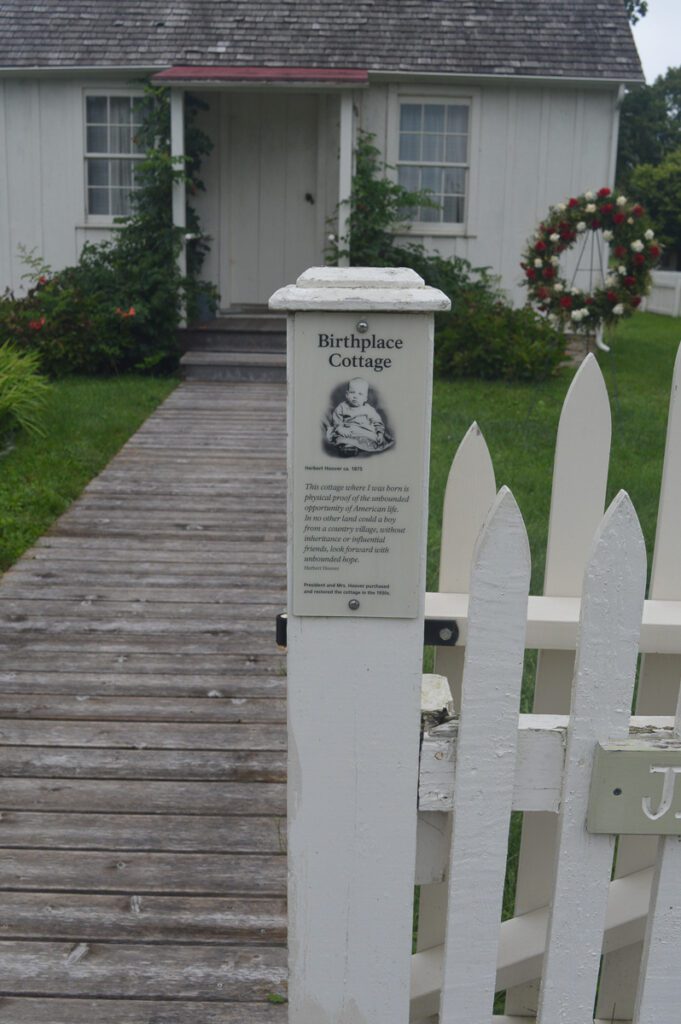
Devout Quakers, the Hoovers stayed a close-knit family; father Jesse thrived as a blacksmith and mother Hulda a schoolteacher. The community of Quakers stressed honesty, industriousness, and simplicity; values Hoover practiced his entire life.
By the age of nine, Hoover and his siblings became orphans. The children separated. Herbert rode a train west to Oregon, where an uncle raised him.
Oregon agreed with the young boy, the landscapes shaping his interest in geology. Hoover was admitted to the very first class at Stanford University, graduating four years later, with a degree in Geology, finding work immediately as a mining engineer. At Stanford, Hoover met an exciting and intelligent classmate, Lou Henry, also receiving her degree in geology. They made a formidable couple who would devote themselves to lifelong humanitarian issues.
Brilliant and conscientious, Hoover began exploring the world for mineral deposits, eventually spending years in Australia, South America, Europe, and Asia. In China, Hoover and his wife, Lou Henry, became caught in the Boxer Rebellion; their community surrounded and repeatedly attacked for a month. Lou worked tirelessly in the makeshift local hospital; Hoover made a name for himself for hiding and caring for Chinese children. These travel experiences awakened him to political views, living conditions across the globe and a sense that a greater war may be on the horizon.
- Humanitarian Work, Europe
While in London in 1914, Archduke Ferdinand fell to an assassin in Sarajevo, and soon after, Germany declared war on France. Hoover, caught within Europe, found the American Consul General begging him for help getting stranded Americans back home. One-hundred-twenty thousand safely evacuated through his efforts within two months.
For Hoover, the work was unfinished. Belgium was overrun by Germany; citizens starved. The situation was quickly becoming desperate.
Tasked with the job of feeding Belgium, Hoover convinced Americans to eat less, asking they begin growing vegetables in yards and pots. This led to sending tons of supplies to both the starving Europeans and the Allied troops. Now, officially head of the Food Administration, Hoover kept this tactic up for the duration of the war, keeping millions of Europeans alive.
The brutal war ended in 1918. Europe stared at ruination and destitution. Millions were homeless, sick, and desperately hungry. President Coolidge appointed Hoover head of the newly organized American Relief Administration and gave him whatever resources he needed. Through Hoover’s brilliance, American farmers thrived, and Europeans survived. Free meals across Belgium, Poland, Russia, and more countries in Europe became known as “Hoover lunches.”
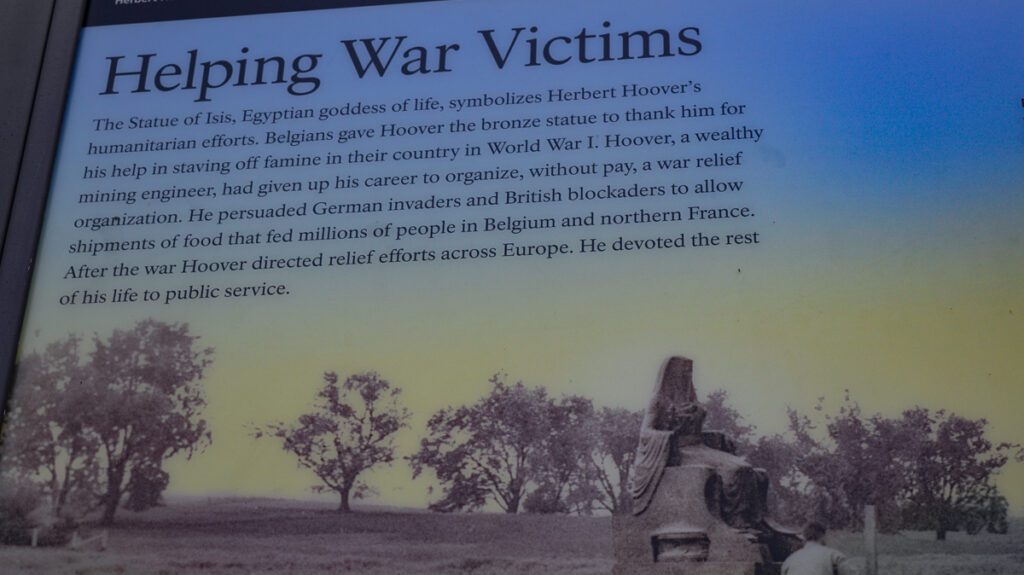
- Humanitarian Work, U.S.A.
Then, in 1927, disaster struck at home. The “Great Mississippi Flood,” ripped through dozens of dirt levees, swamping sixteen million acres of farmland, leaving hundreds of communities without homes or shelter.
Greenville and Vicksburg, Mississippi shattered. At Vicksburg, the river crested at over fifty-six feet, the ‘Mighty Miss” expanding to eighty miles wide. African Americans suffered the worst.
John M. Barry’s captivating book Rising Tide: The Great Mississippi Flood of 1927 and How it Changed America details the devastation, emphasizing how this event carried Hoover into the White House a year later.
Hoover, now Secretary of Commerce, put out the call for action to the American people. Tent cities appeared in every affected state, housing thousands, as the rebuilding of infrastructure, agriculture, businesses, homes, education, and lives began. Throughout Mississippi, Louisiana, Arkansas, and elsewhere entire communities were fed for months on end, with money raised and food sent through the Red Cross. This massive flood, which took place over a span of six or more months, still ranks as one of America’s most devastating disasters.
Hoover said, “I suppose I could have called in the whole of the Army, but what was the use? All I had to do was to call in Main Street itself. No other Main Street in the world could have done what the American Main Street did in the Mississippi flood, and Europe may jeer as it likes at our mass production and our mass organization and our mass education. The safety of the United States is its multitudinous mass leadership.”
These events swept Hoover into the Presidential office by a landslide in 1928.
- The Disastrous Presidency
“I have no fears for the future of our country. It is bright with hope,” stated Hoover in his inaugural speech. Sadly, that was not the case.
In less than a year after that uplifting speech, the Stock Market crashed, dropping the US – and the world – into the Great Depression, the worst economic disaster this country has known.
Failures of banks and businesses were rampant. Unemployment rose sharply to twenty-five percent, with millions across the country suddenly jobless, homeless, and penniless. Times were desperate. Multi-generational families lived in tent cities or shantytowns, eventually called Hoovervilles.
Stores had little or no supplies, causing desperate people to wait in endless lines for staples or a meager meal.
Overnight, Hoover became hated for his stagnancy. Despite his efforts to restart the economy, including revamping banking reform legislature, introducing the Reconstruction Finance Cooperation, developing an agricultural credit system, and overseeing economic conferences promoting trade to stabilize currency, his personal beliefs of limited government intervention stalled all progress. “Prosperity cannot be restored by raids on the public Treasury,” he declared in his 1930 State of the Union address.
The Depression worsened throughout his term. The country was dying, by suicides, the horrific Dust Bowl that afflicted seventy-five percent of the country, and the overall sense of defeat and giving up.
Hoover, once so popular, found himself thrown out of office and erased from memories on the next election.
- The Hoover Presidential Library
“My grandparents and my parents came here in a covered wagon. In this community they toiled and worshipped God …. The most formative years of my boyhood were spent here. My roots are in this soil.” Herbert Hoover
The fascinating story of this highly educated, hardworking, and resolute humanitarian is on display in his Presidential Library in West Branch, Iowa.
Here is his remarkable life story, with tours conducted by National Park Service guides.
A white picket fence encloses the two-room cabin where Hoover was born and raised until his parents died, and he was sent to Oregon. Here is minimalism. One room houses a kitchen and small living space. Across the hall, the only bedroom, with multiple beds. Out the backdoor, is an attached porch with a wood-burning stove that was moved inside during the cold Iowa winters.
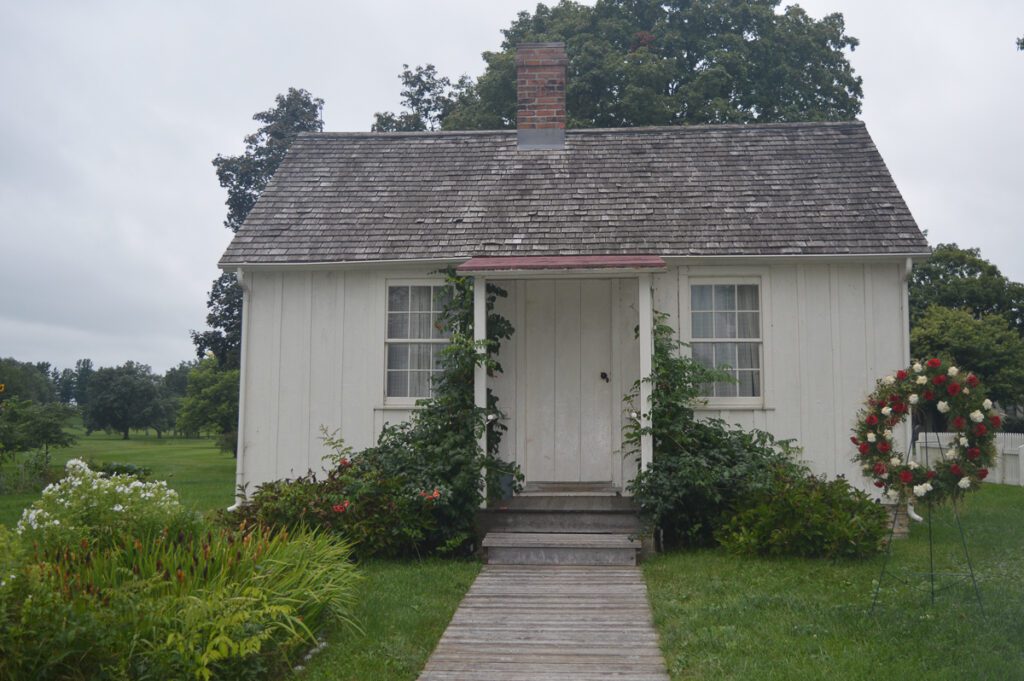
Beyond a plexiglass half-wall visitors view the one-room schoolhouse students of that era attended. It would have been a chilly place, as the wood-burning stove is small and sits at the back of the room, away from both the teacher’s and student’s desks. Light came from the framed windows. Overcast or stormy days would have made the tiny school dark and dismal.
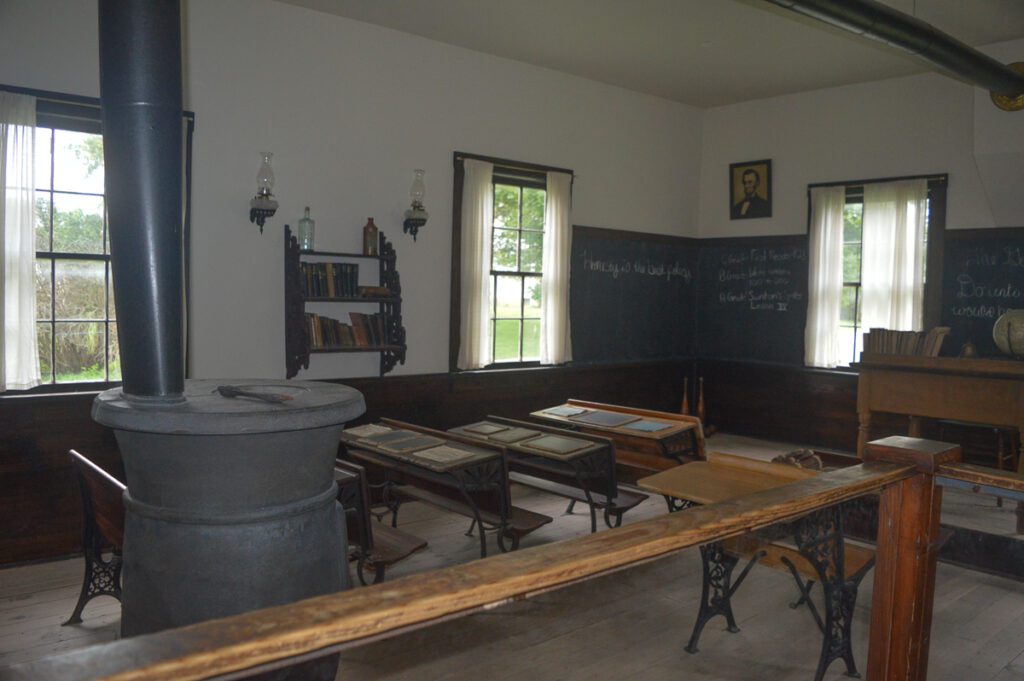
Between home and school, in a clapboard brown building is father Jesse’s blacksmith shop. The forge dominates the room. Here, Jesse made horseshoes, dinner bells, school bells and all forms of everyday needs.
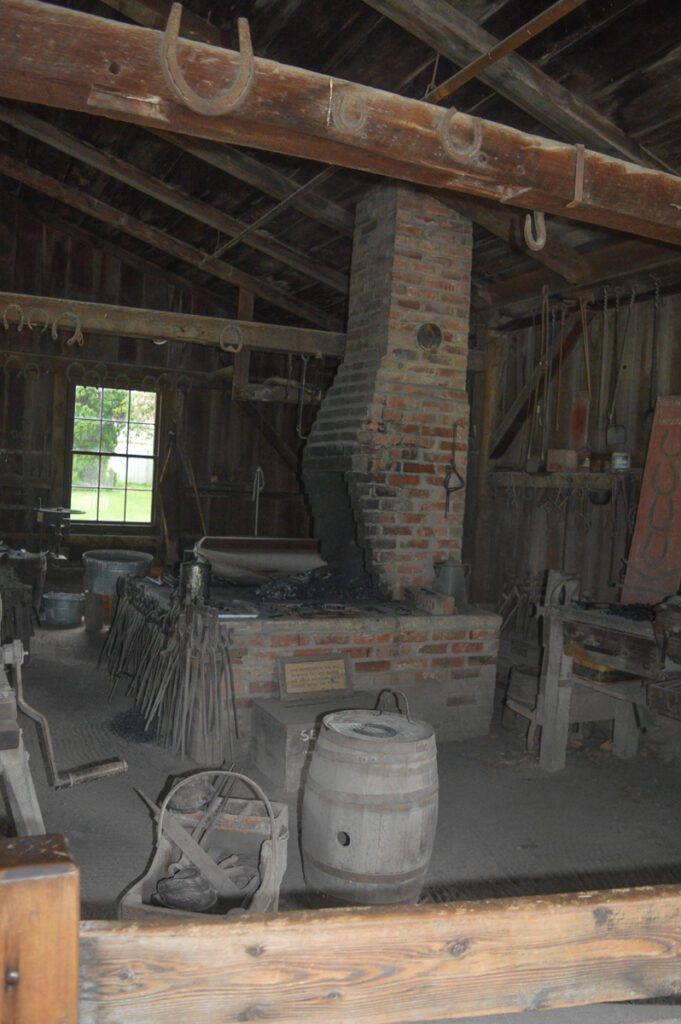
The Presidential Library features a re-created village and sports over two miles of walking trails through a typical Iowa prairie. This lovely, peaceful space, Hoover Creek humming nearby, sees daily walkers in both residents and visitors.
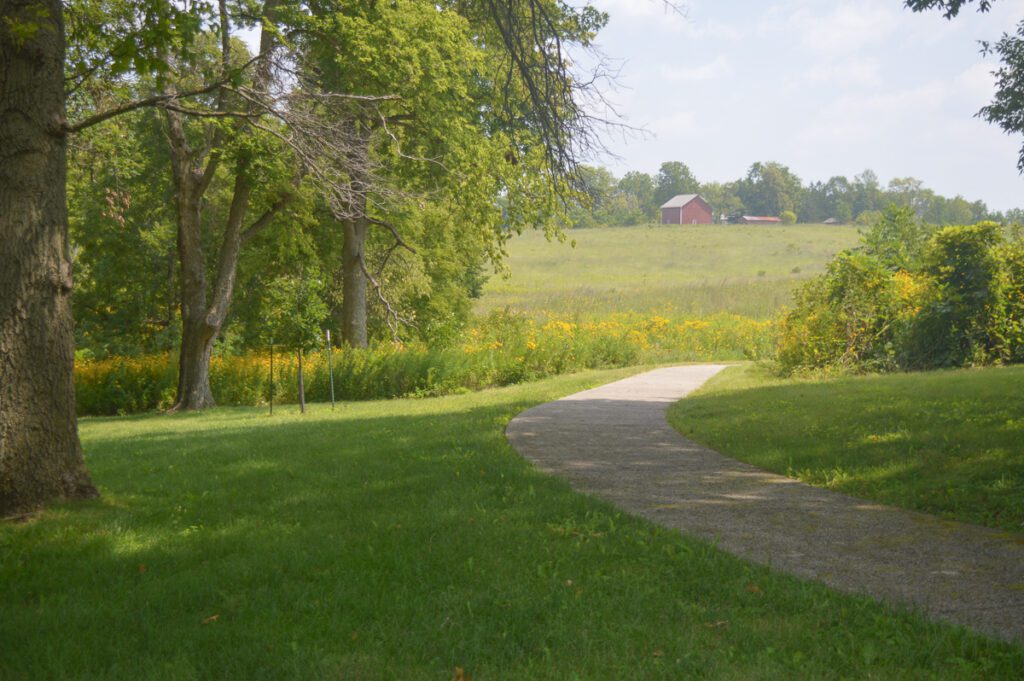
Both Herbert and Lou Hoover have simple marble slabs to mark their final resting place.
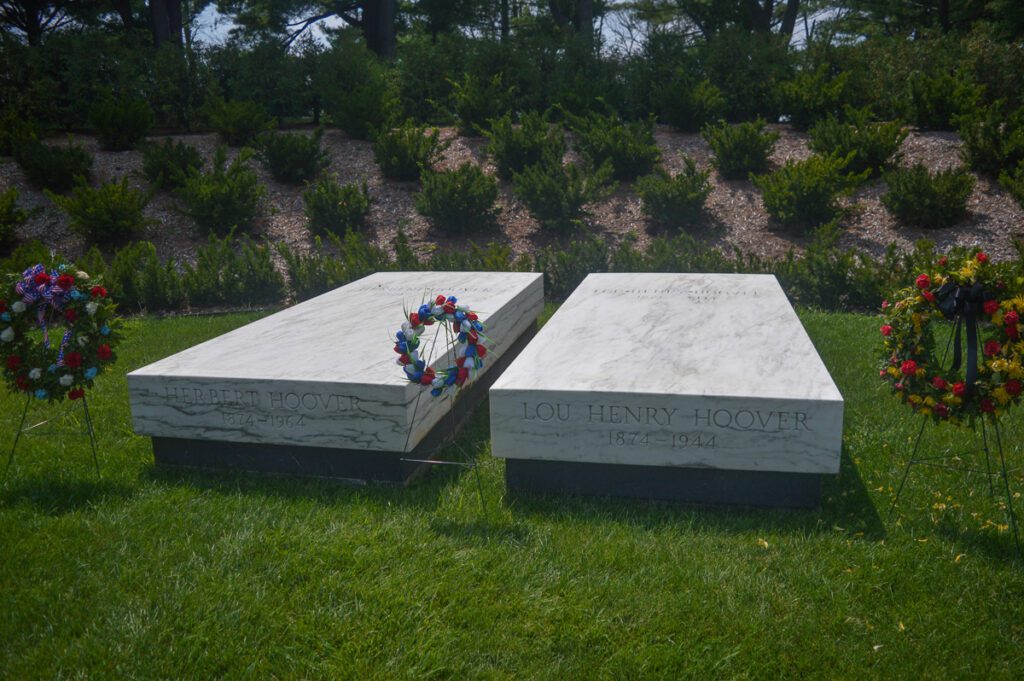
Located just off Interstate 80, the Hoover Presidential Library is a special spot for travelers. Stop by, they will be so happy to educate you on this amazing humanitarian.